"Nothing human is foreign to me" -- was the so-called motto adapted by the founders of the Chicago Women's Club fifty years ago. These founders are nearer than we, their successors, to the great liberal movement of the 19th century. The Roman's statement was typical of what they devoutly believed. Their own fathers and mothers and in many instances they themselves had helped uproot the upas growth of slavery and although bearing many scars, the entire generation was a little heady over their success. The establishment and growth of the public school system was the distinctive achievement of the first half of the 19th Century. Added to the early pride in free institutions had come the belief that they could only be preserved through an educated electorate, that the man at the bottom of society, and above all his children, must be cherished, an protected and given a worthy place. The dignity of manual labor was much stressed, immigrants from all lands were welcomed and their increasing numbers proudly proclaimed by the Federal Government itself as an indication of national progress.
Beneath all this was an exhilarating sense that a change in woman's status was taking place, "women's rights" were being openly discussed in spite of much derision and just a few rotten eggs, and at least in the minds of a few people was dawning the evolutional conception of society.
↑If we↓ remember that the success of an idea depends as much upon the medium in which it is launched as upon the enthusiasm of its promoters, it is not surprising that the Chicago Women's Club with its motto ever in mind, made an astonishing record in its first half century.
In connection with the Public Schools of Chicago they insisted upon women members for the Board of Education; they initiated kindergartens, manual training and domestic science, penny lunches, vacation schools, and high school libraries. They secured the first compulsory education law; [page 2] established the School Children's Aid Society and the Public School Art Society. They promoted the first night classes, the earliest use of a public ↑school↓ as a social center, the first visiting teacher, and the establishment of the John Worthy school for delinquent boys.
Under the departments of philanthropy and reform almost as a test of the sincerity of their motto they secured night matrons in police stations, a jail school for boys, the appointment of women physicians in the state hospitals for the insane, a psychotic director in the Bridewell. They founded the Protective Agency for Women and Children, opened work rooms in a lodging house for women after the World's Fair, and did the same work on a larger scale during the World War, bore a lion's share in the establishment of the Juvenile Court, and in the care and probation of its wards during the first ten years of its existence: aided in the establishment of Glenwood, and in the reorganization of the Industrial School at Park Ridge, and so on indefinitely -- the Milk Commission and the care of the Blind, and many another.
Under the various departments from the very beginning there has been serious study of what is covered by the terms Philosophy, Literature and Art and among the earliest lectures was John Fiske and Thomas Davidson. A sustained interest was maintained in the Egypt Research Committee resulting in a fund for excavation and the purchase of valuable material for the Haskell Museum of the University of Chicago.
In the list of donations made throughout the fifty years [totaling] almost half a million dollars, goodly sums have gone for the mural decoration of the McKinley High School and Art Institute Scholarships. Some of the most distinguished authors of the nation and of England have spoken before the Club, and their committees have become [page 3] responsible for continuous classes in cultured themes and for establishing scholarships in Philosophy and Sociology in the Universities. I could go indefinitely out of my own mind. I recall a valiant effort in that direction which I [illegible] made in Paris in 1900. I was a juror in social economics at the World Exposition. The Chicago Women's Club had sent over the history of its first twenty-five ↑4↓ years of existence as an exhibit in the department of social economy. My national pride, my club loyalty, the honor of my sex, were all involved in my desire to secure a grand prix or at least a gold medal for the club. But the jury of men -- French, Russian, Belgian, German were much perplexed and the more I talked to them about the Club's varied activities the more bewildered [illegible] they became. It would have served me best I am sure to have merely ↑I finally↓ repeated ↑the motto in the best Latin I could command & let it go at that↓ [illegible] this Latin motto under which we work. [page 4]
But all this is history, stirring and inspiring but still of the past. If we look about us to see in what direction the Club can next exert its interpretive skill and unfailing human interest I suppose the most obvious thing would be an understanding of our last Constitutional Amendment. It has among other things decentralized a [huge] industry and thus brought about a reversal of the ordinary processes of industrial growth which indistinctly ↑naturally↓ proceed from the domestic hearth to the factory.
Much the same competition is now going on between small rival stills as was at one time found between small rival wells in the Pennsylvania oil fields. There is displayed much the same type of ruthlessness resulting in destruction of machinery, in terrorism and ↑even↓ in murder. A machine industry by going back into its domestic beginnings has naturally fallen into the hands of those who had never gotten very far from the ↑simpler↓ domestic ↑type↓. They exhibit many of the abortive moods ↑[morals?]↓ of such a type. but The industry ↑unhappily↓ type of manufacturing has also attached to itself shrewd business men trained in an age of complicated commercialism with its inevitable demand for protection. We had grown accustomed during the last decades to the idea that great vested interests connected with the manufacturing of alcoholic drinks brought to bear continuous pressure on Congress and very often on the State Legislatures as well. We had at one time our own "whiskey ring" in Illinois as some of us remember. But the pressure formerly brought to bear on Washington and Springfield has now been transferred to the simplest unit of government, the patrolman on his beat. Special officers detailed to enforce an unpopular law are subjected [page 5] to temptations of the most flagrant corruption. The entire administration of the law in the midst of a population adverse to its enforcement, again reminds one of the ↑a↓ 19th century situation when many of the free slaves found themselves in the midst of a population who were theoretically and practically adverse to their freedom. Some of the former slaves were scarcely less free than they had been before, some of them fell into a sort of peonage and many of them were gradually deprived of the franchise given to them for their own defense. And yet no one could say that it ↑the emancipation↓ was not to the great advantage of the human conscience nor that after ↑the↓ two generations of even ↑under↓ pseudo-freedom have not had an enormous advantage over their forebears.
In addition to the decentralization of the industry business [opportunities] of an unprecedented scale have been opened. Simple peasants have an opportunity to make money such as they never had even dreamed of before. It is not difficult to understand the frail barrier which the mere fact of illegality interposes, the spirit of adventure which is evoked and is in a sense repaid.
↑(2d Nordica)
Harvey story big toad & little toad↓


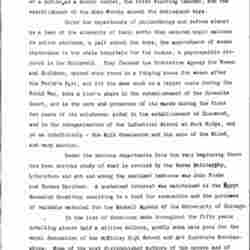
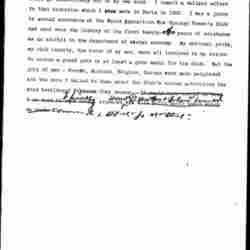
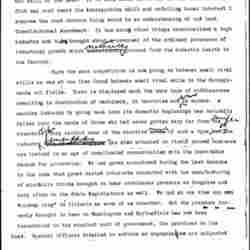
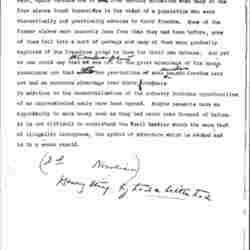
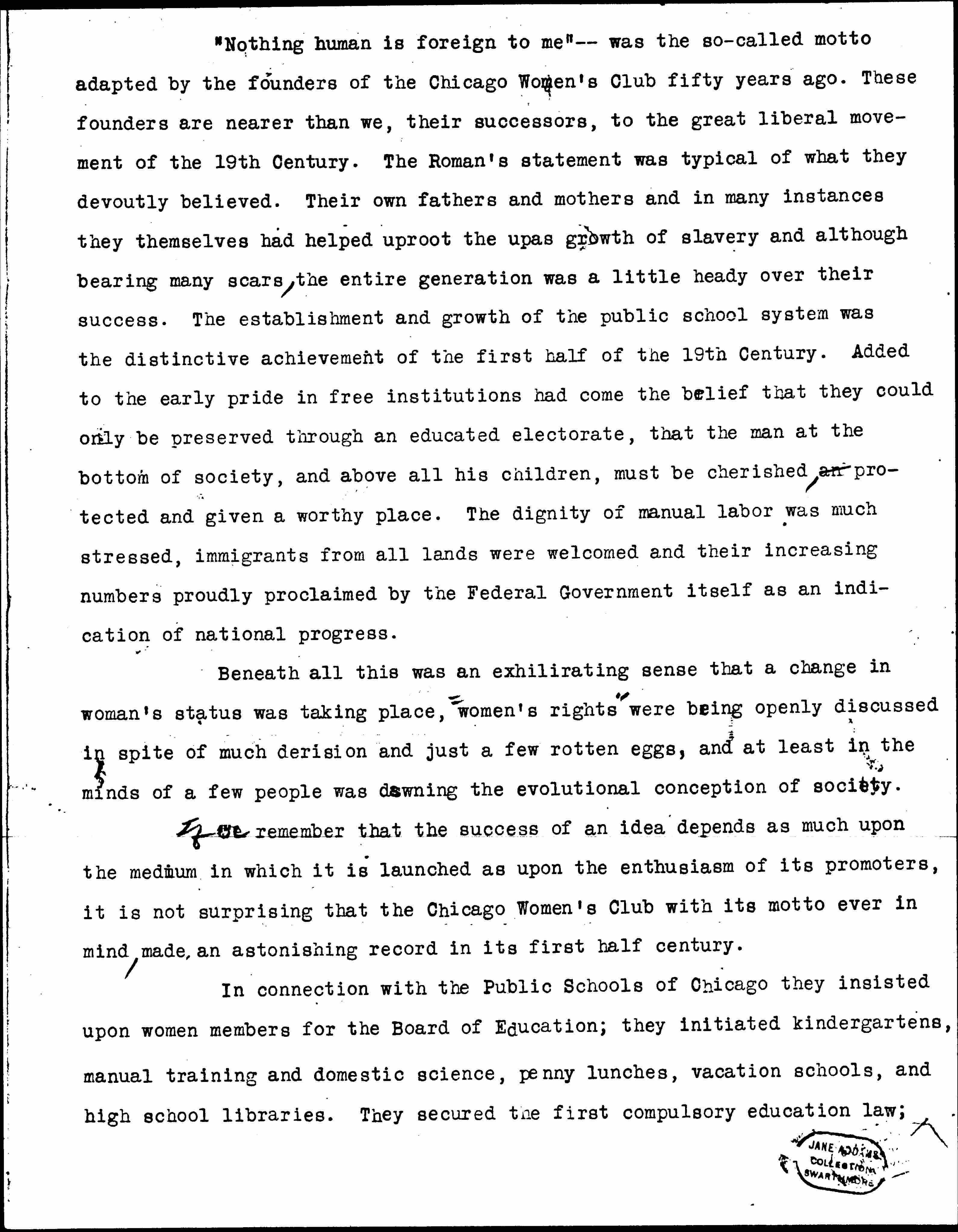




















Comments